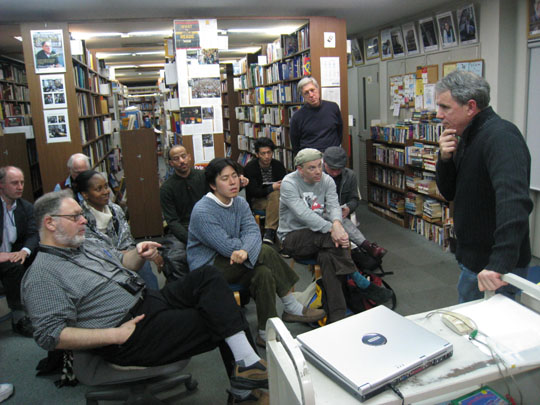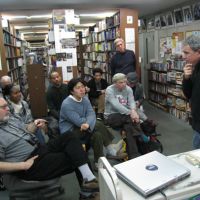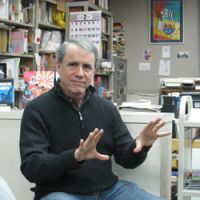Stephen Kott describes himself as the "chief coffee maker" at Good Day Books in Tokyo's Ebisu district. He says it with self-deprecating humor, but it's not a bad metaphor for one of his real duties, which is to serve up an engaging brew of knowledge, opinions and humor in the store's monthly author lectures.
In 2004, Kott added the lecture program to the English bookshop that his wife, Taeko Kobayashi, started in 1992. "I grew up in New York," he said. "For me a bookshop was not just a place where you bought books, it was where you went to hear authors talk." The closest things available in Tokyo at the time were book signings at Japanese bookstores, where Kott found it was difficult to talk to the writers. "When I read a good book, I want to ask the author questions!" he said.
About a dozen budding questioners were in attendance at the latest lecture late-February, in which film critic (and Japan Times contributor) Mark Schilling spoke about Nikkatsu action films from the 1950s and 1960s (and his recent book on the subject "No Borders, No Limits"). It was a niche topic, but he made it entertaining.
"These were 'program films,' " he said, explaining why earlier the highly formulaic films had been ignored by critics. Still, he said, the action narratives set in the "wild West" of postwar Japan, were often laced with interesting cinematic flourishes.
In one clip, Schilling showed how a director had staged a shootout in a cinema, with a film playing on a screen in the background. "See that," he exclaimed, "just as the character shoots the guy, a gunshot goes off in the film on the screen behind them. These films are full of things like that."
Schilling also talked about the young actors in the films, many of whom became overnight stars. The biggest star was Yujiro Ishihara, the late younger brother of Tokyo Gov. Shintaro Ishihara. Yujiro could, Schilling said, "act, sing, and dance. He could do it all."
Mention of Ishihara seemed to bring the Good Day Books crowd to life. Soon the questions were flying thick and fast, and the "lecture" had suddenly come to resemble a discussion group.
"When did Yujiro die?" asked one participant. "I think I went to his funeral, by accident."
As the audience started laughing, Schilling recalled that Ishihara had died in 1987. But it turned out that the person posing the question had crashed someone else's funeral. He had been in Kanagawa, whereas Ishihara was buried in Otaru, Hokkaido. "They have a museum for him there. It's like Graceland," added Schilling.
"Is Shintaro Ishihara the governor just because his younger brother was a famous actor?" came the next question. This provoked a chorus of "nos" from several participants before Schilling, somewhat like a soothing kindergarten teacher, explained that Shintaro had been a famous author in his own right.
Earlier in the day, organizer Kott had explained that "one of the best things about these events is the question-and-answer time."
The next question proved his point: "Why did Joe Shishido have plastic surgery to make him look like a squirrel chewing nuts?" asked one curious attendee about the actor.
That got more laughs from the audience, but Schilling was unfazed. He held up a picture of the Nikkatsu star so everyone could confirm the resemblance. "I interviewed Shishido a few years back," he said. "He was always a very handsome man, so he was only given romantic roles." It turns out that the ladies' man wanted to play toughs, so he enlisted a plastic surgeon to fill out his cheeks.
Audience members were somewhat confused by the logic until Schilling continued: "I asked him who he modeled himself on. The answer was Orson Welles."
After the event concluded, Schilling looked a little relieved. "It's an intimate setting, so you have to be ready to deal with the audience on a one-to-one basis," he said. The audience, it turned out, appreciated the attention. "You get a variety of opinions and good questions, especially about topics like Japanese movies," said Thomas Walker, a four-decade Japan resident and occasional lecture attendee.
Mance Thompson, an eight-year resident, said it was his second Good Day Books lecture — the first being a Donald Keene gig last year. "I was an Asian studies major so in college I read a lot of (Keene's) books. To have the opportunity to meet him in a small setting like this was great," he said. "Mark was cool too."
Kott explained that for many of the participants the monthly talks provide a chance to meet the "great authors" on subjects related to Japan. "We had Ed Seidensticker a couple of times, Donald Richie always gets lots of people, and Keene," he said. "You know, the generation who came here during the Occupation — people just love to come and see them."
But in the next breath he hinted at a gradual changing of the guard. Kott said that recently a lot of authors come to them with lecture proposals. "That's a great thing. Cookbooks, political books: we'll do anything, as long as it's related to Japan. That's the only criteria."
The next Good Day Books BookNotes Lecture Series features Dutch author Hans Brinckmann on March 29. Good Day Books is open Mondays through Saturdays 11 a.m. to 8 p.m., Sundays and holidays from 11 a.m. to 6 p.m. See www.gooddaybooks.com for details.






